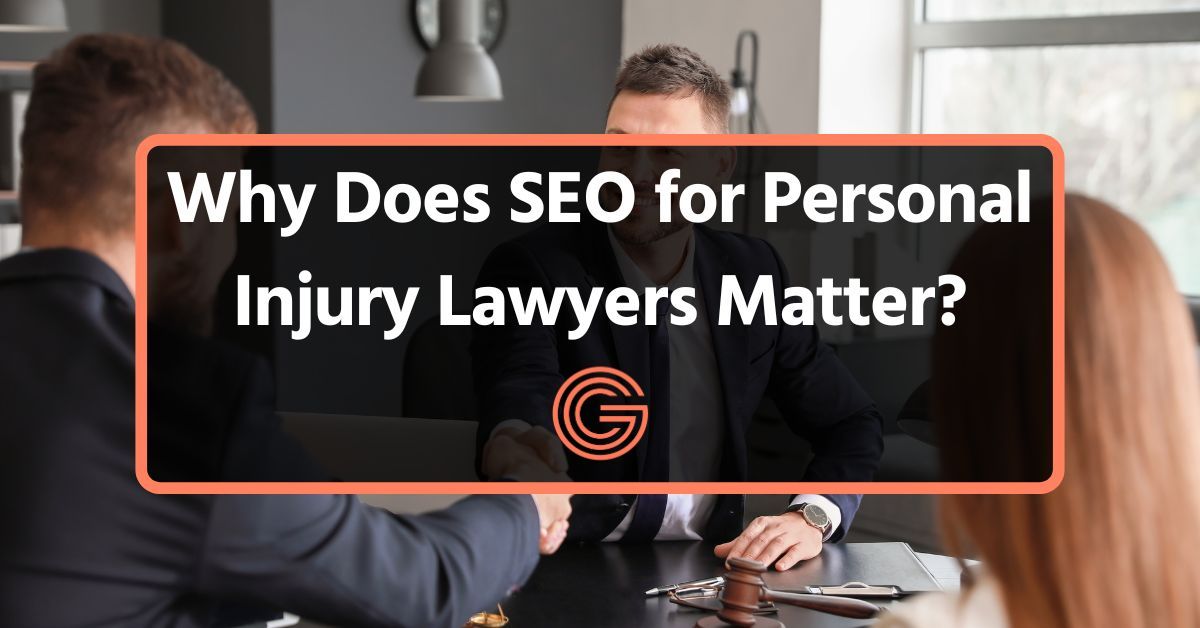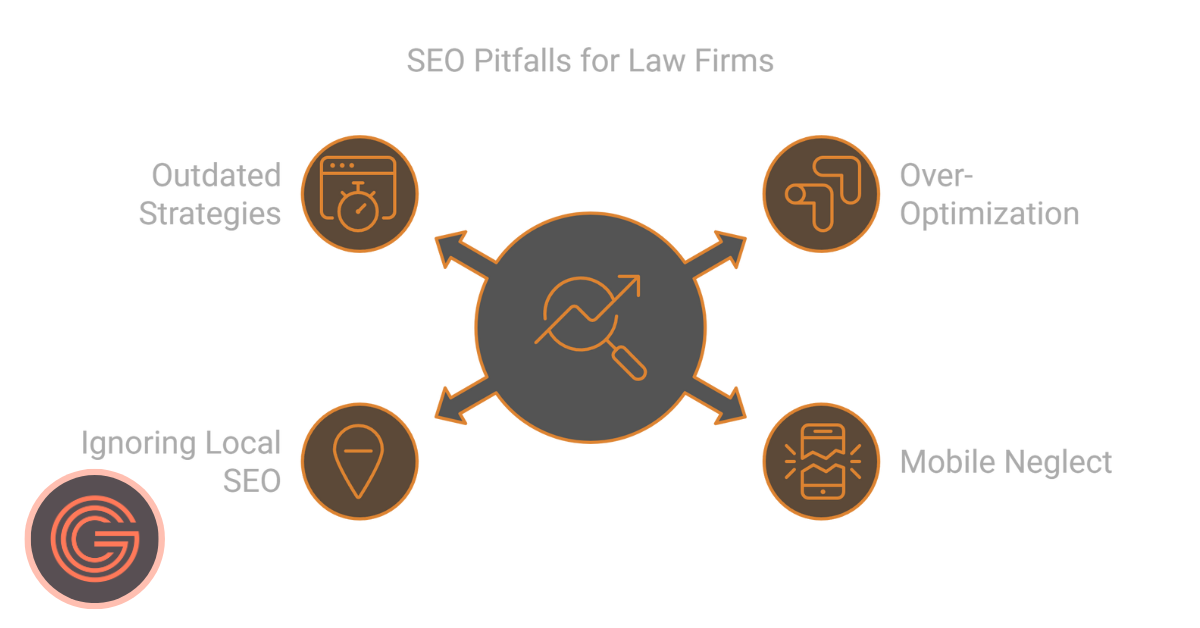
Why Does SEO for Personal Injury Lawyers Matter?
Personal injury law is one of the most competitive legal fields, with countless firms fighting for the same clients. In today’s digital age, most people search online first when looking for legal help, making SEO a necessity, not an option. Without a strong online presence, your firm risks being invisible to potential clients, while competitors with solid SEO strategies dominate search engine result pages.
A well-executed SEO strategy helps your firm rank higher on Google, attract high-intent leads, and build credibility. Unlike paid ads, SEO provides long-term, cost-effective results, keeping your firm at the top of search engines when clients need you most. If your firm isn’t investing in SEO, you’re missing out on valuable cases and revenue.
At GLP Marketing, we understand that SEO for personal injury lawyers isn’t just about rankings, it’s about building trust, authority, and a steady flow of high-intent clients. We specialize in SEO for legal professionals globally, helping attorneys dominate search results and attract the right clients. Contact us today and let us help your firm reach its full potential in revenue and profitability through our personal injury SEO services.
This post will cover why SEO is important for personal injury lawyers, how it works, and what strategies can help law firms attract high-quality leads.
What Is Personal Injury SEO?

SEO stands for Search Engine Optimization and is simply the process of improving your website so it ranks higher in search engine results. But SEO isn’t just about ranking, it’s about attracting the right clients. A well-optimized website ensures that when someone searches for legal help, they find your firm, not your competitors.
Unlike paid ads, which disappear the moment you stop spending, SEO builds long-term visibility. It focuses on organic (unpaid) search results, making it a cost-effective way to generate leads. When done right, SEO helps your firm appear in front of people actively searching for legal representation.
Additionally, search engines like Google use complex algorithms to determine which websites appear in search results. These algorithms consider hundreds of factors to decide which pages are most relevant to a user’s query. However, there are three key factors which include: relevance, authority, and user experience. Generally, the better your website aligns with these factors, the higher your search engine ranking.
Relevance means your content matches what people are searching for. Authority comes from backlinks (other reputable sites linking to yours) and strong content. User experience includes factors like website speed, mobile-friendliness, and easy navigation. Ultimately, this means that if your website is slow, outdated, or hard to use, Google won’t rank it highly, no matter how great your legal expertise is.
Why Does SEO for Personal Injury Lawyers Matter for Growth?
Personal injury law firms that fail to invest in SEO risk being invisible to potential personal injury clients. Unlike traditional marketing, which relies on interrupting people with ads, SEO meets users at the exact moment they need legal help. A well-optimized website ensures that when someone searches for legal assistance, your firm is the first option they see.
One of the reasons why SEO is important for you as a personal injury lawyer is enhanced visibility. Organic search is the lifeline of online marketing. When your website ranks on the first page of Google, it automatically gains credibility. People trust Google’s top results, and a high ranking signals that your firm is reputable and experienced. Another one is you are able to target high-quality personal injury leads. SEO helps you attract clients who need your services right now. People searching for “personal injury lawyer near me” or “car accident attorney in [city]” have urgent legal needs. Unlike broad advertising, SEO ensures you reach these high-intent prospects at the right moment.
Compared to traditional advertising, SEO is cost-effective and offers a much better return on investment. Billboards, SEM (Search Engine Marketing), and TV ads are expensive and don’t guarantee results. SEO, on the other hand, continuously brings in leads without ongoing ad spend. Once your site ranks well, you’ll keep getting traffic without paying per click.
An important reason is that you get to educate potential clients. SEO isn’t just about rankings, it’s about providing value. Many people searching for a lawyer have questions about their case. By publishing helpful legal content, you establish trust before they even contact you. Informative blogs, FAQs, and legal guides position you as an authority and make potential clients feel confident in reaching out.
Finally, a strong online presence backed by positive reviews, quality content, and a well-optimized website builds credibility and trust. When people see your firm consistently ranking, read your helpful content, and find glowing client reviews, they’re more likely to choose you over competitors.
Important SEO Strategies for Personal Injury Law Firms

A strong SEO strategy is an important aspect of every law firm’s marketing plan. For your personal injury law firm to attract high-quality leads and stay ahead of competitors, you need a good personal injury lawyer SEO strategy. By optimizing your website, targeting the right keywords, and improving user experience, you can boost your online presence and drive more client inquiries.
Comprehensive Keyword Research for Personal Injury Law
Finding the right personal injury SEO keywords cannot be over-emphasized. High-intent keywords like “best personal injury lawyer in California” and “car accident attorney in Los Angeles” attract serious clients and help you rank in your service area. Long-tail keywords (more specific phrases) help capture niche searches, like “How much does a personal injury lawyer cost?” Competitor analysis can also reveal valuable keyword opportunities, helping you see what keywords competitors rank for and where you can outperform them.
On-Page SEO Optimization for Personal Injury Lawyer Websites
Title tags and meta descriptions are the first things potential clients see in search results. They need to be clear, compelling and keyword-optimized. Including location-specific terms, like “Los Angeles Personal Injury Attorney,” helps with local rankings.
SEO-friendly content is equally important. Your website should have clear, informative pages that answer common client questions. But keyword stuffing won’t help. Your content should be natural, engaging, and valuable. Also, internal linking (linking to other pages on your site) improves user experience and helps Google understand your website structure.
Local SEO for Personal Injury Attorneys
Most personal injury cases are local, meaning people search for lawyers in their area. That’s where Google Business Profile (GBP) optimization comes in. A well-optimized GBP listing increases your chances of appearing in Google’s local pack (the top three map results). Adding accurate business details, client reviews, and high-quality photos makes your firm stand out.
Local citations such as mentions of your business name, address, and phone number on directories like Yelp, Avvo, and FindLaw, also improve local rankings. Also, don’t underestimate the power of client reviews. You should encourage satisfied clients to leave positive feedback as it boosts your local SEO and builds trust with potential clients.
Content Marketing Strategies for Personal Injury Lawyers
Regularly publishing valuable content helps with rankings and client engagement. You should make sure to write valuable content for Google to improve your SEO performance. Blog posts on topics like “What to Do After a Car Accident” or “How to File a Personal Injury Claim” answer common questions and drive traffic to your site. FAQ pages are also great for ranking in search results, as they directly address common concerns.
Legal guides, case studies, and educational content not only improve SEO but also position your firm as an expert. Additionally, people appreciate clear, informative answers, and they’re more likely to choose a lawyer who demonstrates knowledge through helpful content.
Technical SEO for Law Firm’s Websites
A slow website can hurt your rankings and drive potential clients away. Speed optimization tools like Google PageSpeed Insights can help improve load times. Mobile-friendliness is also crucial—if your site isn’t easy to use on a phone, you’re losing potential clients.
Structured data (schema markup) helps search engines understand your content. Adding legal-specific schema, like attorney profiles or case results, can improve your visibility in search results.
Link Building for Personal Injury Law Websites
Building backlinks from reputable websites increases your site’s authority. Getting listed in top legal directories (Avvo, Justia, FindLaw) helps improve rankings. You should also consider guest blogging on other firm’s sites as this can potentially give you natural backlinks. So, guest blogging on respected legal sites can greatly boost credibility and bring in valuable traffic.
Conversion Rate Optimization (CRO) for Personal Injury Firm
SEO gets people to your website, but CRO turns them into clients. A well-designed site with clear navigation, compelling calls to action (CTAs), and trust signals (testimonials, case results, certifications) increase conversions. For example, strong CTAs like “Get a Free Consultation” encourage visitors to take action.
How to Build Authority in SEO for Your Law Firm

The more expertise and credibility your firm demonstrates, the more trust you build with both search engines and potential clients. There are several ways you can build authority in SEO for your personal injury law firm.
One way is guest blogging and press releases which can help position your firm as a legal expert. Writing guest articles for reputable legal websites or news outlets improves your domain authority and increases your visibility. Press releases can also showcase case wins, firm achievements, or legal insights, further strengthening your firm’s reputation.
Publishing expert legal content is another important strategy. Detailed guides, case studies, and FAQs on personal injury legal services provide valuable information for potential clients while boosting your SEO. Keeping this content updated with new laws and real case examples helps maintain relevance and authority.
Showcasing your credentials and experience is one way you can use in your strategy to build trust. When you highlight awards, certifications, and years of legal expertise on your website, you reassure potential clients of your credibility. Also, attorney bios that include case successes and media mentions further establish your firm’s authority.
Optimizing for local SEO is equally important. Creating and updating your Google Business Profile will make sure your firm appears in local searches. Additionally, getting listed in legal directories like Avvo, Justia, and FindLaw increases your online presence. A well-crafted attorney bio can also make a difference in how clients perceive your firm.
How to Measure SEO Success and Track Website Traffic
Tracking performance is key to long-term success. Tools like Google Analytics and Search Console help monitor organic traffic, keyword rankings, and user behavior. Furthermore, key performance indicators (KPIs) like conversion rates, lead quality, and search visibility show whether your SEO efforts are paying off.
How to Boost SEO Performance for Your Personal Injury Firm
If you want to take your SEO to the next level, you should start by optimizing meta tags and headers to improve search visibility. Well-structured meta tags help Google understand your content and rank it accordingly.
Ensure your website is mobile-friendly since most users search for lawyers on their phones. A slow or unresponsive website can lead to lost leads. Using the right SEO tools can help identify areas for improvement and keep your strategy on track.
Getting featured in local directories and legal websites strengthens your local SEO presence and can help you reach more personal injury clients. Structured data (schema markup) helps search engines display key information about your firm, such as practice areas and client reviews.
Optimizing for voice search is becoming increasingly important as more users rely on smart devices for searches. Creating case-specific landing pages can also boost rankings by targeting high-intent clients searching for specific types of cases, like “car accident lawyer in Los Angeles.”
What to Avoid for a Successful SEO Strategy?

While SEO can drive significant growth for your personal injury law firm, certain mistakes can hold you back. Avoiding these pitfalls ensures your strategy remains effective and aligned with search engine best practices.
Over-optimization is a common mistake that can harm your rankings instead of improving them. Keyword stuffing (forcing too many keywords into your content) makes it unreadable and can trigger Google penalties. Similarly, unnatural link-building, such as buying low-quality backlinks, can damage your site’s reputation. Focus on creating natural, high-quality content that earns links organically because Google frowns at buying backlinks at all.
Neglecting mobile users can cost you potential clients. Google prioritizes mobile-friendly websites, so if your site isn’t optimized for smartphones, it could rank lower in search results. A slow or unresponsive mobile site also frustrates users, leading to higher bounce rates and lost leads.
Ignoring local SEO can make it harder for potential clients in your area to find you. Failing to claim your Google Business Profile, missing out on local directories, or not using location-specific keywords can prevent your firm from appearing in local search results. Since many personal injury cases are time-sensitive, being visible in local searches is important.
Outdated strategies can hurt your SEO performance. Search engine algorithms constantly evolve, and techniques that worked years ago, such as keyword stuffing or excessive backlinking, can now lead to penalties. So, you need to stay informed about algorithm updates and SEO best practices to make sure your strategy remains competitive.
Looking for an Effective SEO Strategy for Your Law Firm?
SEO is important for personal injury lawyers looking to stay competitive in today’s digital landscape. A strong SEO strategy enhances visibility, attracts high-intent leads, and builds trust and credibility through authoritative content, positive reviews, and local optimization. Key strategies include comprehensive keyword research, on-page and local SEO, technical optimizations, content marketing, and link building. Tracking success with Google Analytics and SEO tools ensures continuous improvement while avoiding outdated or spammy tactics to protect rankings. By investing in SEO best practices, personal injury law firms can drive more qualified leads, improve conversions, and establish themselves as go-to legal experts in their communities.
At GLP Marketing, we have the knowledge, experience, and expertise to help scale your business with SEO. With our local SEO services, we’ll make sure that your personal injury firm is found in local search results and ultimately get you more high-intent clients. So, if you want to optimize your law firm’s SEO, contact us today to get started!
FAQs Personal Injury Law SEO
SEO can be confusing, especially with so many moving parts. To help, we’ve answered some of the most common questions personal injury lawyers have about SEO, from keyword research to local optimization. If you’re new to SEO or looking to improve your strategy, these quick answers will point you in the right direction.
How Can I Find Relevant Keywords for My Personal Injury Firm?
Use keyword research tools like Google Keyword Planner or Ahrefs to find high-intent search terms like “best personal injury lawyer near me.” Focus on long-tail and local keywords to attract targeted leads.
How Much Does Law Firm Website Design Cost?
Law firm website design costs vary based on features, customization, and SEO integration.
Why Is Local SEO Important for Law Firms?
Most clients search for lawyers near them, so optimizing for local search helps your firm appear in Google’s local pack, Google Maps, and relevant searches, driving more qualified leads to your practice.
How Soon Can You Expect Results From SEO Efforts?
SEO is a long-term strategy, and results typically take 3 to 6 months, depending on competition, website authority, and optimization efforts. However, consistent SEO work leads to lasting growth.
How To Find an SEO Expert for Personal Injury Law Firms
Look for an SEO agency with legal industry experience, proven case studies, and transparent strategies. GLP Marketing specializes in SEO for personal injury lawyers, so contact us to see how we can help!
SEO Marketing Agency
Our mission at GLP is to propel businesses to new heights with the highest level of SEO services